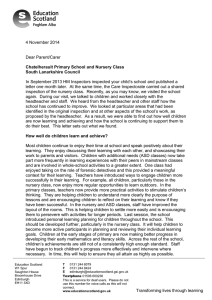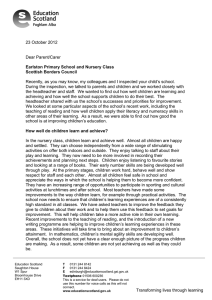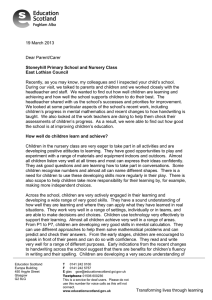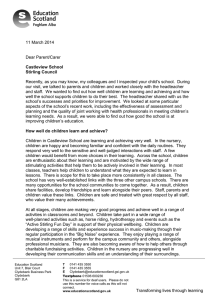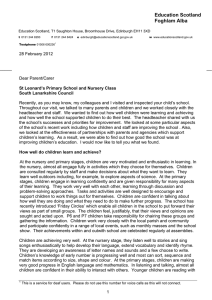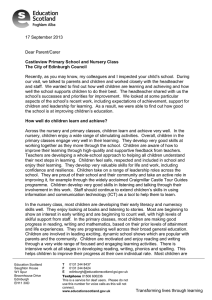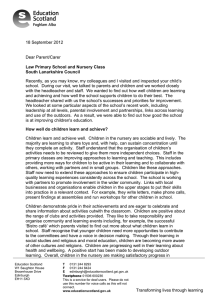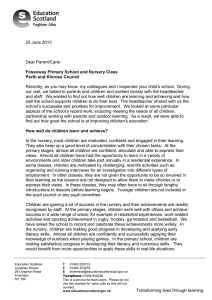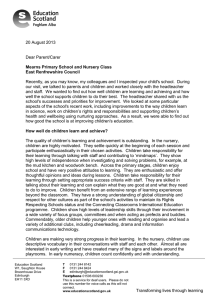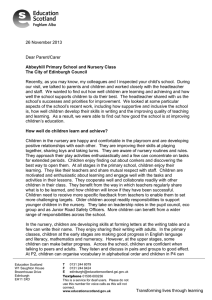17 February 2015 Dear Parent/Carer ’s school. During
advertisement
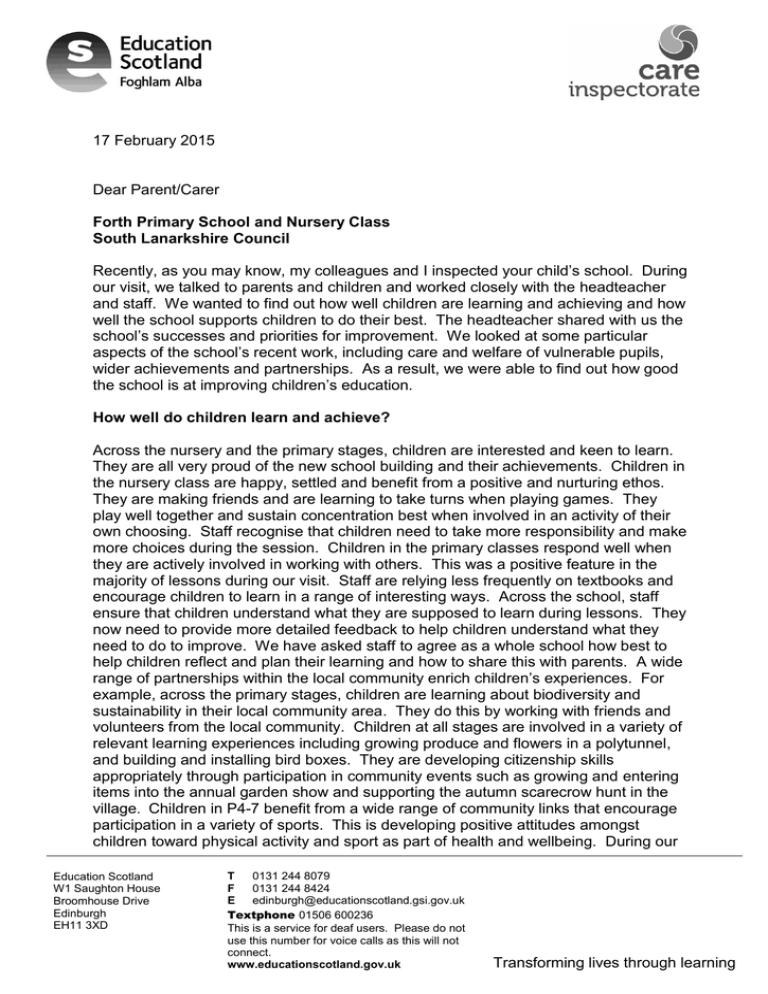
17 February 2015 Dear Parent/Carer Forth Primary School and Nursery Class South Lanarkshire Council Recently, as you may know, my colleagues and I inspected your child’s school. During our visit, we talked to parents and children and worked closely with the headteacher and staff. We wanted to find out how well children are learning and achieving and how well the school supports children to do their best. The headteacher shared with us the school’s successes and priorities for improvement. We looked at some particular aspects of the school’s recent work, including care and welfare of vulnerable pupils, wider achievements and partnerships. As a result, we were able to find out how good the school is at improving children’s education. How well do children learn and achieve? Across the nursery and the primary stages, children are interested and keen to learn. They are all very proud of the new school building and their achievements. Children in the nursery class are happy, settled and benefit from a positive and nurturing ethos. They are making friends and are learning to take turns when playing games. They play well together and sustain concentration best when involved in an activity of their own choosing. Staff recognise that children need to take more responsibility and make more choices during the session. Children in the primary classes respond well when they are actively involved in working with others. This was a positive feature in the majority of lessons during our visit. Staff are relying less frequently on textbooks and encourage children to learn in a range of interesting ways. Across the school, staff ensure that children understand what they are supposed to learn during lessons. They now need to provide more detailed feedback to help children understand what they need to do to improve. We have asked staff to agree as a whole school how best to help children reflect and plan their learning and how to share this with parents. A wide range of partnerships within the local community enrich children’s experiences. For example, across the primary stages, children are learning about biodiversity and sustainability in their local community area. They do this by working with friends and volunteers from the local community. Children at all stages are involved in a variety of relevant learning experiences including growing produce and flowers in a polytunnel, and building and installing bird boxes. They are developing citizenship skills appropriately through participation in community events such as growing and entering items into the annual garden show and supporting the autumn scarecrow hunt in the village. Children in P4-7 benefit from a wide range of community links that encourage participation in a variety of sports. This is developing positive attitudes amongst children toward physical activity and sport as part of health and wellbeing. During our Education Scotland W1 Saughton House Broomhouse Drive Edinburgh EH11 3XD T 0131 244 8079 F 0131 244 8424 E edinburgh@educationscotland.gsi.gov.uk Textphone 01506 600236 This is a service for deaf users. Please do not use this number for voice calls as this will not connect. www.educationscotland.gov.uk Transforming lives through learning visit, children were well behaved and eager to talk to us and share their views. The pupil council are pleased with the success they have had in improving playtimes including the recent addition of ‘buddy stops’. The school recognises the importance of broadening the scope of committees and groups to include younger children. Children are developing respect for others through their participation in annual events to raise funds for charities such as the ‘Strawberry Tea’. Children at the primary stages have their achievements celebrated through assemblies and displayed on the ‘wonder wall’. Children in the nursery class enjoy looking at books and listen carefully to stories being read to them. The majority are making good attempts at writing their name. Most children can count and recognise a few numbers. Children are not yet using and developing their skills fully enough across all aspects of their play. They do not all have daily opportunities to learn outdoors. At the primary stages, children are making satisfactory progress in language and literacy. Throughout the school, children are confident and articulate. Most children listen well and can follow instructions. Discussion and debate are encouraged in a few classes. For example, children in P7 successfully took part in a debate on the referendum. At the early stages, children are developing their early reading skills well. At times, the pace of learning for a few children needs to be quicker. By P7, children are able to identify a range of strategies to use when analysing their reading books. Children need to be encouraged further to apply these developing skills to a wider range of texts. Children show care and present their written work well. Attainment in writing has improved with the introduction of Big Writing. We have asked staff to ensure children are able to apply their writing skills across all areas of the curriculum. In mathematics and numeracy, children are confident overall when carrying out mental and written calculations. Children at the early stages are developing an understanding of money and, by P5/6, they are developing an understanding of financial education. Overall, children need to apply and develop their numeracy skills in different, real-life situations to help improve their understanding and confidence. Children at the primary stages use information and communication technology well to support their learning across most areas of the curriculum. How well does the school support children to develop and learn? Staff in the nursery class have a good knowledge of individual children and their needs. In partnership with the nursery class, the home link worker has introduced a well-received programme ‘You and your child’ to help explore aspects of child development with parent and carers. Currently, children in the nursery class do not have enough opportunities to develop their learning in science and technology. Staff at the primary stages plan learning for their classes using Curriculum for Excellence guidance. There is currently no whole-school approach to developing the curriculum in order that children make suitable progress across all subject areas. Staff need to work together more effectively to build on individual developments and by so doing develop a stronger approach to teamwork. It will be important to establish a clear rationale for the curriculum that is understood and shared by all. The school is currently introducing a new science programme at the primary stages and there is scope to include the nursery in this work. Children are beginning to benefit from the new programme which aims to ensure they make appropriate progress in science. Such whole-school planning for progression in children’s learning now needs to take place across other 2 areas of the curriculum. Children receive high-quality physical education delivered in line with national expectations. The headteacher is very committed to ensuring the school develops positive links with the local community. In partnership with the parent council, the whole school community worked together to produce a commemorative book as part of the move to the new building. A very successful ‘Daffodil Tea’ event also strengthened community links and involvement during this time. Links with other agencies provide important support for children needing additional help with their learning. Support assistants play a valuable role and are well deployed both to support individual children and to provide assistance to whole-class groups. Overall, lessons are at the right level for most children. At times however, learning is too slow and lacks challenge, particularly for higher-attaining children. Teachers are not yet planning effectively enough to ensure children build on what they already know, particularly when they move classes. There is a well organised programme to help children feel confident when they move on to Carluke High School. How well does the school improve the quality of its work? The headteacher and staff recognise there is a need to look again at the school’s vision for what it wants to achieve for children and to develop a clearer set of values which are shared by the whole school community. This will provide a basis for future school improvements. The move to the new building is a good opportunity to begin to revisit this shared vision and develop important aspects of the curriculum to ensure all children make better progress. It will be important the views of staff, parents and children are used well to inform these changes. The parent council support the school and have been helpful in raising funds. Overall, the school’s approaches to evaluating and improving its own work are not effective enough, and as a result, children’s experiences and achievements are not of a high enough standard. Approaches to tracking and monitoring children’s progress is at an early stage of development in the nursery and school. Many staff have taken on particular aspects of responsibility, but these have not lead to sustained improvements. Clearer leadership is needed in the nursery to ensure all children learn and achieve well. Senior management should proceed with their plan to support all staff to develop their understanding of best practice in teaching and learning. Together they need to develop the curriculum and raise children’s attainment. In doing so, the senior managers and staff need to reflect continually on their practice and evaluate new developments to ensure that they are improving children’s experiences and achievements. During the previous Care Inspectorate inspection, the nursery class had one recommendation that has been partially addressed. Outstanding issues relating to participation of children and parents in relation to planning are carried forward in this inspection. As a result of this inspection, there is one requirement and four recommendations. Details can be found at the link below. This inspection found the following key strengths. Confident, polite and well-behaved children who are eager to learn and proud of their school. Increasing range of active learning approaches that encourage children to work well with others. 3 The range of opportunities for children in the upper stages to engage in physical activity and sport. Well-established and effective links with community partners to enhance and support children’s learning in the local community. We discussed with staff and South Lanarkshire Council how they might continue to improve the school. This is what we agreed with them. Improve the curriculum to ensure all children can make suitable progress in all aspects of their learning. Ensure staff are supported to work together more effectively to develop and sustain improvements. Improve approaches to tracking and monitoring children’s learning to ensure they all achieve as highly as possible. Ensure approaches to evaluating the work of the school take account of the views of children, staff and parents more fully. What happens at the end of the inspection? As a result of our inspection findings we think that the school needs additional support and more time to make necessary improvements. Our Area Lead Officer will work with South Lanarkshire Council to build capacity for improvement, and will maintain contact to monitor progress. We will return to carry out a further inspection within 12 months of publication of this letter. We will then issue another letter to parents on the extent to which the school has improved. Mary Ann Hagan HM Inspector Additional inspection evidence, such as details of the quality indicator evaluations and national care standards gradings, for your school can be found on the Education Scotland website at http://www.educationscotland.gov.uk/inspectionandreview/reports/school/primsec/Fort hPrimarySchoolSouthLanarkshire.asp If you would like to receive this letter in a different format, for example, in a translation please contact the administration team on the above telephone number. If you want to give us feedback or make a complaint about our work, please contact us by telephone on 0141 282 5000, or e-mail: complaints@educationscotland.gsi.gov.uk or write to us addressing your letter to the Complaints Manager, Denholm House, Almondvale Business Park, Livingston EH54 6GA. 4
